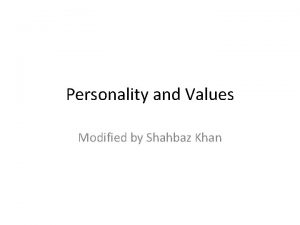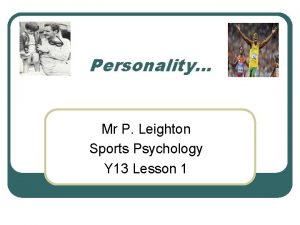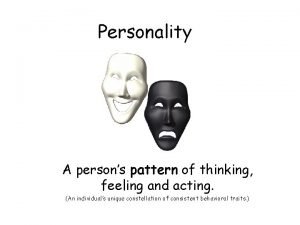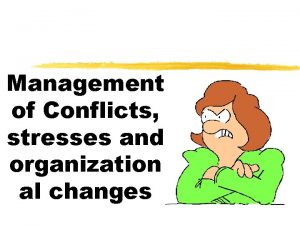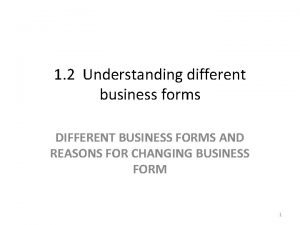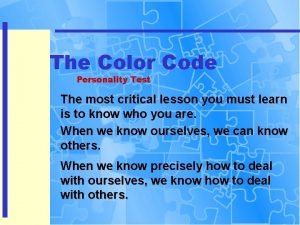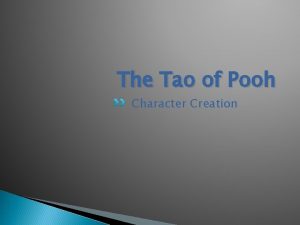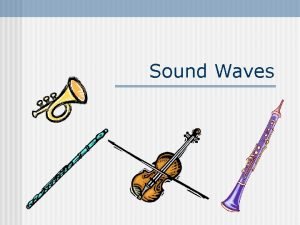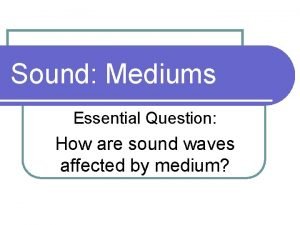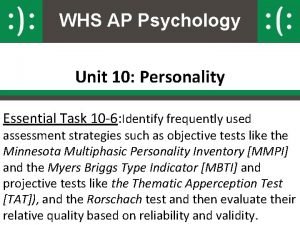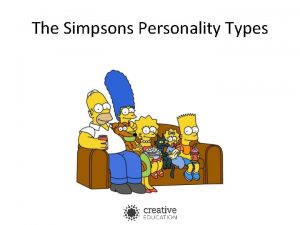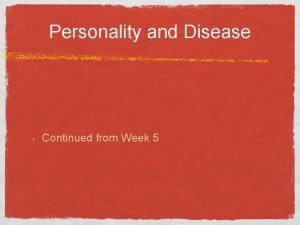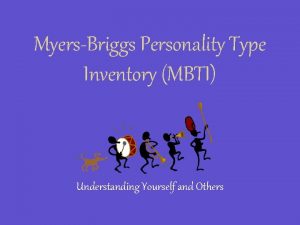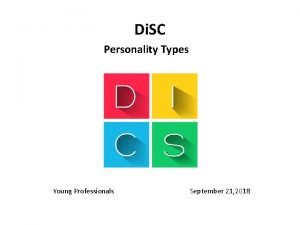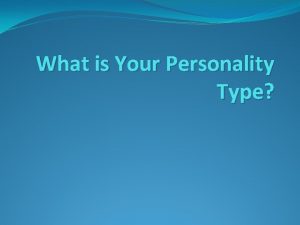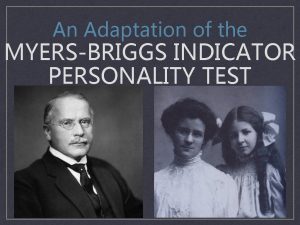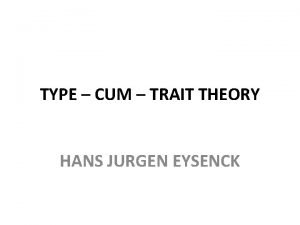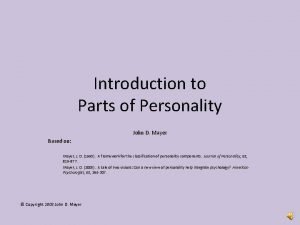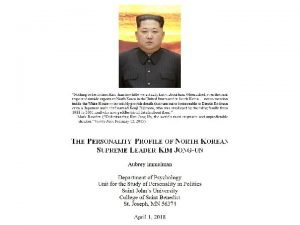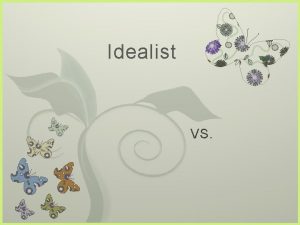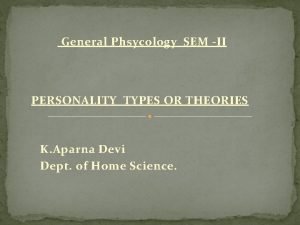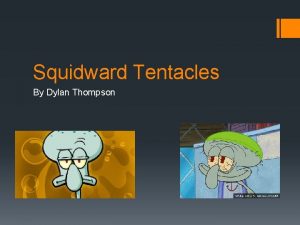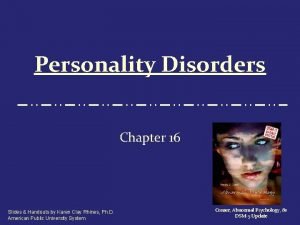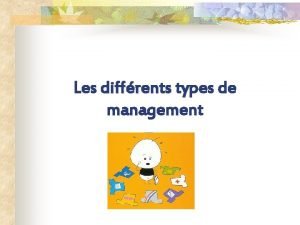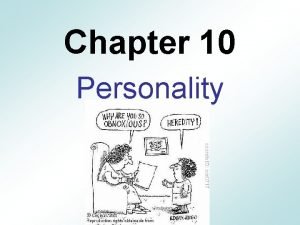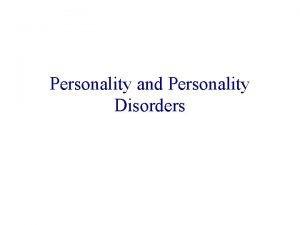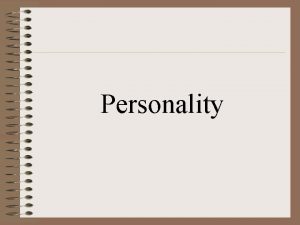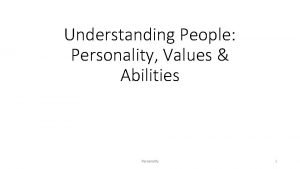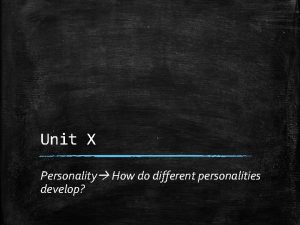Understanding Different Personalities History of Psychological Type Personality

































































- Slides: 65

Understanding Different Personalities

History of Psychological Type Personality Type Based on Carl Jung’s Theory of Psychological Type Personality type is genetically programmed We are born with our type pre-determined

Jung’s Theory Jung believed that: As adolescents, we specialize. We know what we like and we “go for it”. We are surprised when people do not see the world in the same way that we do. Adolescence is seen as a tumultuous time.

Jung’s Theory Jung believed that: The “middle years” are a time to “try on” the other side. We have gained experience. We see the need to use other preferences. We have been “forced” or “required” to use other preferences. Conflict (internal) can often arise.

Conflict can be seen as: A positive thing. An opportunity for growth. An indication that the personality is becoming more “rounded”. An indication that there is transition taking place.

ASSUMPTIONS UNDERLYING TYPE Preferences are inborn Environment impedes or enhances expression of type Type is dynamic not static All types are equally valuable There is no one best way to be

ASSUMPTIONS Similar people often bond more quickly – similarities give strength Similar partners may experience boredom Different people often attract – differences fascinate Different partners may conflict

Temperament predisposes us to certain ways of thinking , understanding, conceptualizing and acting. Little research done Example – Think of different breeds of dogs and their behavior traits

Myers-Briggs Dichotomies (Keirsey Sorter) Four dichotomies Extraversion / Introversion (E/I) Sensing / Intuition (S/N) Thinking / Feeling (T/F) Judging / Perceiving (J/P)

16 Personality Types ISTJ ISFJ INTJ ISTP ISFP INTP ESFP ENTP ESTJ ESFJ ENTJ

Representation in the General Population Extrovert / Introvert There are 3 times as many extraverted preference people in the population as introverted preference people

Extraversion Focus attention and energy on the world outside of themselves Talk/act first, think later Think out loud - brainstorming Communicate with enthusiasm Respond quickly – enjoy a fast pace Talk more than listen Dominate conversations Like being the center of attention

Extraversion Focus attention and energy on the world outside of themselves Know a lot of people Have lots of friends Are very approachable Reveal personal information Prefer to work with groups Prefer breadth to depth They maximize interactions

Introversion Focus attention and energy on the world inside of themselves Think, then act Rehearse things before speaking Listen more than talk Avoid being the center of attention Are energized by spending time alone Need to recharge after group interaction Keep their enthusiasm to themselves May be called shy, cool, aloof Like to share with one person Irritated by repetition

Introversion Naturally read between the lines and look for meaning in all things Love to fantasize Are prone to puns and word games Tend to give general answers Get irritated when pushed for specifics Trust inspiration and inference Think about several things at once Like figuring out how things work Value imagination and innovation Find the future intriguing Prefer depth to breadth

Representation in the General Population Sensing / Intuition The kinds of information that we focus on or naturally notice 2/3 of the general population has a preference for sensing while 1/3 has a preference for i. Ntuition

Sensing Concentrate on what can be seen, heard, felt, smelled or tasted Focus on what is real and concrete Take a practical approach Value common sense If it ain’t broke, don’t fix it Like to hear things sequentially not randomly

Sensing Concentrate on what can be seen, heard, felt, smelled or tasted Are literal in the use of words Prefer specific answers to specific questions Rather do something than think about it Learn from past experiences Like to use and hone established skills Like jobs that have tangible results Live in the present

i. NTUITION Naturally read between the lines and look for meaning in all things Trust & Values inspiration and inference Think about several things at once Like figuring out how things work Look for interrelatedness rather than face value Value imagination and innovation Find the future intriguing Emphasizes concepts, theories, relationships and possibilities

Representation in the General Population Thinking / Feeling The way that we make decisions and come to conclusions There are more thinking preference males in the general population and more feeling preference females

Thinking Prefer to make decisions using an impersonal approach. Prefer decisions that make sense logically. Pride themselves on objectivity Are sometimes seen as cold, insensitive, and uncaring More important to be right than liked Make decisions impersonally, Prefer logic Are motivated by a desire for achievement and accomplishment

Thinking Prefer to make decisions using an impersonal approach. Prefer decisions that make sense logically. Able to stay cool, calm, and objective when others are upset Value fairness and truthfulness over popularity These people evaluate ideas and data objectively and value inferences reasonably drawn from events and circumstances more than any other type of evidence. More firm minded than gentle hearted Naturally see flaws and tend to be critical

FEELING Prefer to make decisions based on personal values Take the feelings of others into consideration when making decisions Value empathy and harmony – see the exception to the rule Do anything to accommodate Naturally like to please others. May be seen as overemotional, illogical and weak

FEELING Prefer to make decisions based on personal values Prefer harmony over clarity Accused of taking things too seriously Will jeopardize own position for others Very thin skinned Avoid conflict at all cost Do anything to accommodate Show appreciation easily Are motivated by a desire to be appreciated


Representation in the General Population Judging / Perceiving The kind of lifestyle that we like to lead 60% of the general population has a preference for judging while 40% has a preference for perceiving

JUDGING Tend to live in an orderly way and are happiest when their lives are structured and matters are settled. Work ethic - work first, play later (if there is time) A place for everything and everything in its place Plan the work and work the plan Don’t like surprises Keep lists and use them Thrive on order They push strongly for closure Set goals and work toward achieving them on time

JUDGING Tend to live in an orderly way and are happiest when their lives are structured and matters are settled. Seek to regulate and control life Can become unraveled if things don’t fall into place Derive satisfaction from completing a project See time as a finite resource and take deadlines seriously Prefer a structured, scheduled, planned and controlled environment Tend to be organized, deliberate and capable of making decisions with a minimum of stress.

PERCEIVING Like to live in a spontaneous way and are happiest when their lives are flexible Are happiest leaving their options open Don’t like to plan, prefer to wait and see “Play” ethic – enjoy now, finish the job later (if there is time) Depend on last minute spurts of energy to meet deadlines Like adapting to new situations

PERCEIVING Like to live in a spontaneous way and are happiest when their lives are flexible Value creativity, spontaneity, and responsiveness Change goals as new information becomes available Love to explore the unknown Accused of being disorganized Are process oriented (emphasis is on how the task is completed) See time as a renewable resource and see deadlines as elastic

Extravert/Introvert Extraverts may see introverts as secretive, unfriendly aloof, self absorbed, slow and awkward When dealing with Extraverts, allow them to think out loud, use verbal communication, expect action, keep the conversation flowing. Let them work in groups and make oral presentations. Introverts may see extraverts as superficial, too talkative, loose canons, overwhelming, pushy and rude When dealing with Introverts ask a question and then stop to listen. Give them time to work alone, to finish their

Sensors/Intuitives Sensors can regard intuitives as unrealistic “Space cadets, ” new age, careless about details, unrealistic Work with an intuitive by talking about the big picture, possibilities, implications, analogies, before talking about details. Intuitives can view sensors as resisting new ideas, boring, unimaginative, “old school. ” Work with a sensor by drawing on past proven experience, focus on practical applications, and step by step solutions.

Thinkers/Feelers Thinkers may see feelers as illogical, too emotional or trying too hard to please With thinkers: Be organized, consider cause and effect, pros and cons, focus on consequences, appeal to fairness Feelers may see thinkers as insensitive or distant or self-involved With feelers: mention points of agreement, focus on their core values, appreciate their contributions, state legitimacy of their feelings, discuss emotional impact of situation

Judgers/Perceivers • Judgers may view perceivers as wishy-washy procrastinators, unproductive, unreliable, not serious • With judgers: be on time, come with agenda and conclusion, stick to plan, organize • Perceivers view judgers as rigid, controlling black and white, stubborn, trigger happy • With perceivers: focus on process, be open to new information, expect questions, allow for discussion

Keep in mind Type Theory suggest behaviors strongly connected to a preference may become welldeveloped and comfortable making it harder for persons to perform tasks associated with the opposite scale without conscious thought and substantial practice.

Negotiation strategies require behaviors that many people may be adept with but they may also require behaviors that many are not drawn to naturally

Adversarial/Problem Solving • Adversarial • Gain Maximizing • Problem Solving • Fair deal making

Adversarial Strategies Proceed in a linear fashion Negotiators attempt to induce, persuade or deceive other into deviating from the positions Threats and attacks are used Inquires regarding facts and issues are evaded or shared reluctantly

Problem Solving Strategies Involves a cognitive commitment to searching for fair solutions Flexible Non-linear First indentifies underlying needs Looks for solutions that maximize potential for all parties Information is used to generate understanding about each other’s interests

Sensors The sensing preference is inclined to value concrete, detailed, factual information that can be verified by the five senses This tendency can influence attitudinal and behavioral orientations that may be directly related to important components of an adversarial strategy that they may cause sensors to favor this approach.

Sensors tend to prefer an adversarial strategy because it tends to unfold in a structured and easily tracked and linear fashion. Adversarial approaches focus on limited or fixed resources and single bargaining dimension. Sensors typically like to measure clearly and concretely what has been done and what steps remain to be accomplished.

Sensors in an effort to gather more facts tend to ask more questions Focus on whether a settlement zone exists between articulated positions. Sensors tend to pursue adversarial strategies that “limit negotiators to searching for and using information within its linear framework. ”

Sensors While sensors may avoid problem solving strategies they use adversarial strategies effectively They are good at articulating and justifying positions They tend to be well prepared Use technically precise language Focus on detail helps them justify positions

Sensors frequently feel uncomfortable with a problem solving approach Sensors more comfortable with the immediate, the concrete and the practical Sensors better at recognizing when the opponent is blocking

Sensors are naturally inclined to focus on the specifics. This helps them avoid imprecise or ineffective articulations of the problem. “Sensors deal with facts and details of situations …. But rarely implicates the meaning and possibilities that could be gleaned from them. ” But, Deadlock may result if the compromise can’t be reached.

Sensors/Intuitives Sensors are less effective at articulating problem- solving strategies Problem solving strategies focus on general concerns rather than specific details. Problem solving proposals get to specifics more slowly while parties elaborate their needs Sensors may get frustrated with this method

Intuitives Problem solving strategies used by Intuitives are much less structured. Focus on identifying needs Less focus on step by step behavioral patterns such as reciprocal concessions and information exchange Abstract search for interests and solutions But Intuitives sometimes don’t pay sufficient attention to the details

Intuitives/Sensors Proposed solutions in problem solving strategy should initially emphasize general concerns rather than specific details Articulating proposals in problem solving strategy effectively requires behaviors inconsistent with the natural tendency of sensors to focus on specific details. Emphasis on general concerns rather than specific details

Thinking/Feeling Thinkers emphasize logical and impersonal aspects of negotiation Impersonal form of assertiveness Usually prefer an adversarial approach Competing to maximum gain Cooperation based on legitimate interests of others is more difficult for thinkers

Thinkers Not focusing on the needs of others is consistent with the impersonal decision making tendencies of thinkers Focusing on the interests of others involves dealing with emotional issues Thinkers tend to respond to attacking comments with strongly phrased counter attacks - this intensifies conflict and my lead to impasse

Feelers are naturally attracted to problem-solving strategies Feelers prefer harmony and agreement Do not favor a winner take all strategy Feelers more concerned about their relationship with other negotiators

Feelers tend to give in to impersonally assertive competitive behaviors They tend to neglect one’s own concerns to satisfy another’s needs May make undue concessions to avoid conflict Feelers may not be effective when dealing with an adversarial opponent

Feelers are usually good at ‘active listening’ This can facilitate cooperation Active listening is an effective way to deal with strong emotions Feelers have greater sensitivity to relational aspects of personal interactions. This helps them monitor process issues (process refers to the way negotiations unfold rather than the intrinsic merits of the issues discussed. )

Judging/Perceiving scale can be seen as closure/spontaneity Judgers want to make decisions – get things done Judgers favor an adversarial strategy Judgers like to control the flow of information Judgers favor an adversarial approach that defines and orders issues, while the problem solving approach seeks to address the needs and interests of the parties.

Judging Extensively prepare Judgers more inclined to plan and schedule Stick rigidly to plans (stand firm) (sometimes convince themselves of the rightness of their view despite the empirical evidence Judgers attempt to control Schedules, agenda, others, (one way communication)

Judgers tend to become frustrated with a lack of progress Frustration may lead to threats Threats are sometimes used prematurely and haphazardly. Threats made without due consideration are usually a negotiating error

Perceivers more comfortable with a problem solving approach avoid commitment while advancing proposals and solutions Remaining uncommitted helps insure that the proposals and solution intersect with the needs of all parties It promotes refining and improving suggestions to provide optimal mutual benefit.

Perceivers Tend more adept at generating alternative ways of completing tasks This adeptness correlates well with a problem solving approach Perceivers always want to learn more Perceivers however have to be careful about not revealing too much Blocking a question by responding to a question with a question comes naturally to a perceiver

Perceiving While perceivers always want more information – their tendency to be spontaneous or acceptance of ad hoc approaches sometimes leads to acting without careful consideration. Perceivers preferring to act spontaneously have greater difficulty preparing and planning. This is more a problem in adversarial situation than problem solving

Extravert/Introvert Extraverts enjoy verbal interactions involved in negotiating Extraverts enjoy working with teammates Extraverts are more likely to seek out expert testimony Extraverts are comfortable with stating their case in an adversarial strategy But also comfortable with stating clients needs in a problem solving strategy

Extraverts can error in rushing out an offer while there is still uncertainty of valuation (Some tendency to talk and not listen) Speak before developing thoughts May inadvertently leak damaging information May over answer questions and provide too much information

Extraverts While extraverts may be inclined to over share this is in fact an important aspect of a problem solving strategy Brainstorming Discussing ideas that aren’t yet fully developed without worry comes more naturally to extraverts Good for preparation Extraverts seek feedback

Introverts Non-talkative (better listeners usually) Internal Nondisclosure of information (selectively disclose information) Better blocking strategies Also recognize sooner when the opposition is blocking But not as good at thinking on their feet (being spontaneous) Tend not to be team players

Introvert/Extraverts Sometimes clash in style Extraverts become frustrated with introverts slower responses Introverts get frustrated with the quantity of questions from an extraverted opponent Extraverts interrupt more Extraverts feel stonewalled/Introverts pressured

Population Distribution http: //www. mypersonality. info/personality-types/population-gender/
 Https //16 personalities.com/free-personality-test
Https //16 personalities.com/free-personality-test 16 personalities.com/free-personality-test
16 personalities.com/free-personality-test 16 personalities.com/free-personality-test
16 personalities.com/free-personality-test Https //www.16 personalities.com/free-personality-test
Https //www.16 personalities.com/free-personality-test 16 personalities.com review
16 personalities.com review Pseudocode challenge answers
Pseudocode challenge answers How do different personalities affect teamwork?
How do different personalities affect teamwork? Narrow band theory in sport
Narrow band theory in sport Mbti percentages
Mbti percentages Type a
Type a Physique and chemique are
Physique and chemique are Different business forms
Different business forms In disc, people with s personalities,
In disc, people with s personalities, Printable color code personality test
Printable color code personality test Color code
Color code Phallic fixations
Phallic fixations Winnie the pooh personality characteristics
Winnie the pooh personality characteristics M&m personality test
M&m personality test Biographies of salvadoran personalities
Biographies of salvadoran personalities Quiz on famous personalities of india
Quiz on famous personalities of india Logistician personality definition
Logistician personality definition Who are called historical personalities
Who are called historical personalities 16 personalities.com
16 personalities.com It helps us understand people and societies
It helps us understand people and societies Body dysmorphia irvine
Body dysmorphia irvine Why do different polymers have different properties?
Why do different polymers have different properties? Why do different atoms produce different colors
Why do different atoms produce different colors Sound will travel at different speeds in different mediums.
Sound will travel at different speeds in different mediums. Sound travels fastest through
Sound travels fastest through What is cultural relativism
What is cultural relativism Different angle different story
Different angle different story Acid and base song
Acid and base song Manufactured boards examples
Manufactured boards examples We are all different but the same
We are all different but the same Argumenterande tal struktur
Argumenterande tal struktur Unit 10 personality ap psychology test
Unit 10 personality ap psychology test Infp simpsons
Infp simpsons Simpsons personality type
Simpsons personality type John the baptist personality type
John the baptist personality type Type a vs b personality
Type a vs b personality Type c personality
Type c personality Type c personality
Type c personality Make me bark mbti
Make me bark mbti Sc personality
Sc personality Type b personality disorder
Type b personality disorder Integrator personality type
Integrator personality type Mbti meaning
Mbti meaning Alec benjamin personality type
Alec benjamin personality type Cum theory
Cum theory John mayer personality type
John mayer personality type Kim jong un personality type
Kim jong un personality type Idealist personality problems
Idealist personality problems Devi personality type
Devi personality type 5 minute animal personality test
5 minute animal personality test Type c personality
Type c personality Conclusion of stress management
Conclusion of stress management Character traits of squidward
Character traits of squidward Type c personality disorder
Type c personality disorder Histrionic personality disorder
Histrionic personality disorder Type a
Type a Larry page personality
Larry page personality What personality type was stalin
What personality type was stalin 3 types of sports
3 types of sports Different type de management
Different type de management Claim of value claim of fact claim of policy
Claim of value claim of fact claim of policy Types of charaters
Types of charaters


